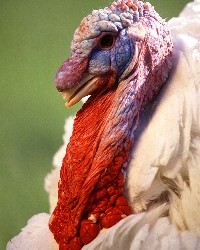Researchers from the U.S. Department of Agriculture (USDA) and colleagues from universities, research institutes, industry, and other agencies have sequenced the majority of the genome of Meleagris gallopavo, the domesticated turkey, creating the first-ever turkey genome map. The nearly complete map could help growers to more efficiently produce bigger, meatier turkeys. The research is reported today in the online journal PLoS Biology.
The research was a partnership led by Curtis Van Tassell and Julie A. Long with the USDA’s Agricultural Research Service (ARS); Otto Folkerts and Rami Dalloul of Virginia Tech University’s Bioinformatics Institute (VBI); and Steven L. Salzberg of the University of Maryland’s Center for Bioinformatics and Computational Biology, at College Park. The entire project involved 68 scientists affiliated with 28 national and international institutions.
The researchers used new DNA sequencing technology that relied on high-throughput instruments at the ARS laboratory in Beltsville, Maryland and at VBI in Blacksburg, Virginia. The technology produces millions of DNA sequences simultaneously. The instrumentation used at VBI characterized longer strands of turkey DNA, while the ARS researchers focused on characterizing many more short DNA fragments, permitting greater detail through deeper sequencing of those fragments, according to Van Tassell.
The overall turkey genome was compiled by assembling the various DNA fragments. To achieve that, the scientists had to develop new computer programs to interweave the DNA strands of varying lengths. The turkey genome assembly was further aided when physical, comparative, and genetic maps built by researchers from Michigan State University and the University of Minnesota were used to match the DNA sequences to turkey chromosomes.
Americans consume about 17.6 pounds of turkey per capita every year, and the U.S. produces nearly 6 billion pounds of turkey meat annually, making it the fourth most popular meat in the U.S.


 RSS - Posts
RSS - Posts
You must be logged in to post a comment.